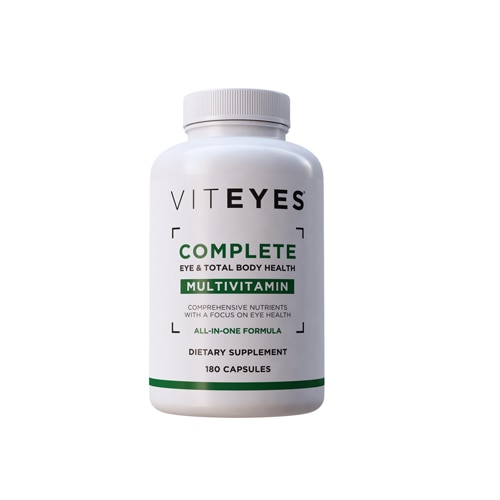The topic of taking vitamins on a regular basis seems to be a somewhat controversial one; some experts believe that vitamins can be protective, while others tell us that most people can get all the vitamins and minerals they need by eating a healthy, balanced diet.
 What Do Dietary Supplements Do?
What Do Dietary Supplements Do?
What we do know is that vitamin supplements can help to fill in gaps of micronutrients in your diet, which can be helpful for things like getting enough vitamin B12, vitamin D, folate and so on. However, make no mistake about it, vitamins (and other supplements, too) won’t make up for a poor diet and unhealthy lifestyle.
What Can't Supplements Do for You?
Here are five things supplements cannot do for you, and what to do instead:
1. Replace vegetables and fruit in your diet
There’s no supplement substitution equivalent to a diet filled with a variety of whole foods, especially fresh vegetables and fruits. These foods provide not only essential vitamins and minerals — such as magnesium, potassium and vitamins C and A — but also fiber, antioxidants and other phytonutrients.
Health experts suspect that it’s the synergy of different nutrients found in whole foods that enables them to support our health, as opposed to individual vitamins and minerals. This may be one reason why researchers have concluded that multivitamins don’t necessarily reduce the risk for a number of chronic health problems.
What you should do instead: Try filling half your plate with veggies and fruits at every meal. Some of the best sources of vitamins include: leafy greens like spinach and kale, all types of berries, oranges, kiwi, sweet potatoes, carrots, broccoli and so on.
2. Provide you with fiber
Dietary fiber has a number of important benefits for your overall health, including supporting the digestive, cardiovascular and immune systems. If you rely on getting vitamins from supplements instead of food sources like vegetables, whole grains, beans and nuts, you’ll be missing the fiber that’s needed for digestive regularity, controlling your appetite, and more.
What you should do instead: Eat high-fiber foods, which tend to also be high in vitamins and minerals. Some sources that stand out include all sorts of beans, lentils, berries, greens, chia seeds and flax seeds, apples, quinoa, etc.
3. Meet your calorie needs
Vitamin supplements provide micronutrients, but they don’t provide macronutrients — meaning carbohydrates, protein and fats. You can only get macronutrients from eating actual foods, and you’re most likely to get the proportion that you need by aiming for variety.
In other words, then you’ll help to ensure that you get both micronutrients and macronutrients in ratios that support your health.
What you should do instead: Aim to include a wide variety of foods in your diet — various veggies, different meats, nuts, seeds, eggs, fish and dairy for example.
4. Change the fact that you need to sleep enough and deal with stress
While there’s no doubt that the quality of your diet is important for your health, let’s not forget that other factors are too, including how much sleep, exercise, sunlight and exposure to the outdoors, and social support you get. No supplement is going to replace the protective effects of regular physical activity, a good night’s sleep, close relationships, and time spent in nature.
What you should do instead: Prioritize getting adequate sleep, between 7-9 hours for most adults, which is important for strengthening your immune system and much more. Get regular exercise (at least 30 to 60 minutes daily), spend some time outside each day, and find ways to unwind so that stress doesn’t wind up contributing to health problems.
5. Protect you from getting sick
Studies have found that taking multivitamins and other supplements won’t necessarily keep someone from developing heart disease, cancer, cognitive decline and other issues in the same way that a nutrient-dense diet does.
In fact, very high doses of certain vitamins may even be problematic or dangerous. For example, taking too much beta carotene, calcium, and vitamins A, E and D may increase the risk for certain liver, cardiovascular, nerve and kidney problems.
That being said, people who are considered “high risk” for certain health issues due to nutrient malabsorption, genetic factors or older age may benefit from supplements if deemed appropriate by a doctor.
What you should do instead: Consider supplements a possible safety net and boost to an otherwise healthy diet and lifestyle. If you struggle with known health issues like osteoporosis, inflammatory bowel disease or vision related problems, then talk to your doctor about which supplements are the best for you to take.
So what’s the bottom line?
Don’t let your use of supplements become a distraction from healthy lifestyle practice.
Taking certain vitamins may provide you with benefits by reversing nutrient deficiencies, especially those that tend to be most common, including deficiencies in vitamin D, magnesium, folate and vitamin B12 for example. But it’s still crucial to eat a healthy diet, get enough sleep and exercise, maintain a healthy weight, and reduce your intake of sugar, sodium and unhealthy fats.



